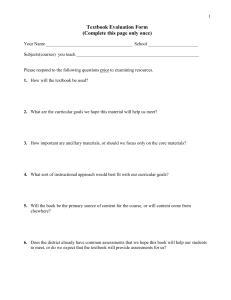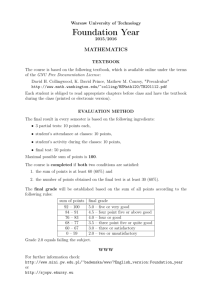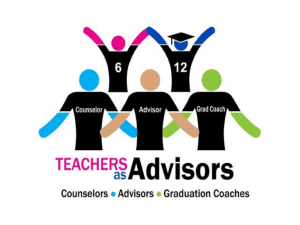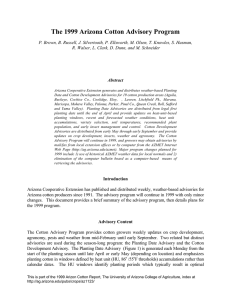National Spanish Examination 2006
advertisement
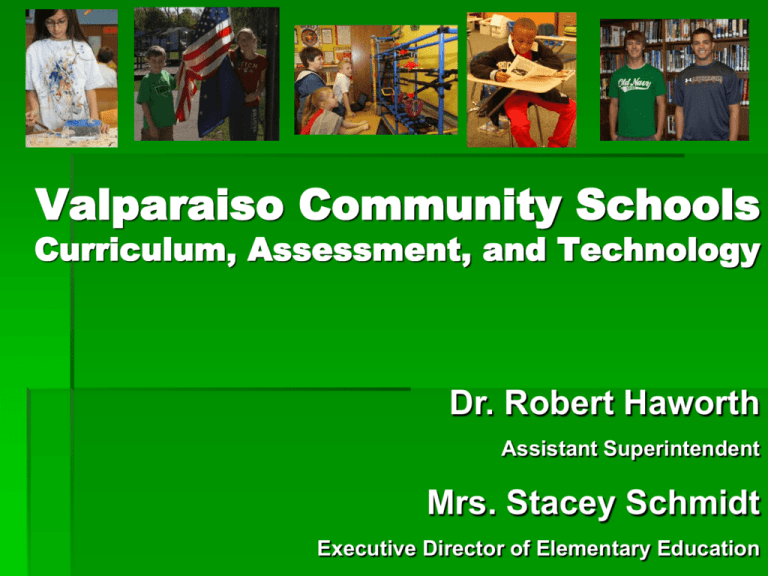
Valparaiso Community Schools Curriculum, Assessment, and Technology Dr. Robert Haworth Assistant Superintendent Mrs. Stacey Schmidt Executive Director of Elementary Education Agenda 1. 2. 3. 4. 5. Strategic Planning & Advisories Curriculum Process Standards-Based Reporting Types of Assessment Technology Strategic Plan Finished this past November Three areas of concern Finances & Facilities Communications Student Achievement Student Achievement Each student will experience challenging and appropriate instruction Each student will be a contributing citizen in our democratic society Strategic Plan District Curriculum & Assessment Advisories will meet to create and update curriculum maps starting in 2010 (Curriculum) A District Literacy Advisory will be established by February of 2011 to develop a comprehensive approach to literacy. (Literacy) An Experiential Education Academy Advisory will be established in February of 2011 to develop a comprehensive approach for implementing experiential education in grades 6-12. (Experiential Education) Alternative school committee representatives will be established in February of 2011 to develop a comprehensive approach to K-12 alternative education. (Alternative School) The current Wellness Committee will review and revise the current wellness plan by March of 2011. (Wellness) A Character Advisory will be established by April of 2011. (Character) The current Safety Committee will review and revise the current safety plan by March of 2011. (Safety) A Positive Behavior Interventions and Supports (PBIS) plan will be researched by March of 2011 (PBIS) A School Mentoring Advisory will be established by April of 2011(Mentoring) Strategic Plan Advisories Wellness Safety Literacy Character Mentoring Experiential Education Alternative Education Positive Behavioral Intervention Systems (PBIS) Curriculum How it Works Strategic Plan Advisory Structure: Teachers Wellness Safety Community Staff Character Mentor Experiential Parents Alt. Edu PBIS Students Literacy School Board Curriculum Whole Student Committee (Advisory Chairs) District Where are we now? Advisory Chairs have been identified Advisories members are been identified and selected Advisories will begin meeting in late February and March Advisories will begin reporting out to the School board in the near future Curriculum Process The curriculum process follows the Indiana textbook adoption cycle 2008 – Language Arts / World Languages 2009 – Social Studies 2010 – Mathematics (took a waiver) 2011 – Science / Health 2012 – Art / Music / Business / Technology Education / Family & Consumer Sciences Curriculum Process Year 1 - Before textbook adoption Revise / develop curriculum Create curriculum maps Year 2 - During textbook adoption Begin assessment writing Review textbook materials Conduct gap analysis Curriculum Process Year 3 - After textbook adoption Begin standards-based reporting Begin using new texts Implement new assessments Create resource documents Curriculum Process 2010-2011 Curriculum Work Mathematics (adopt textbook) Science (adopt textbook) Language Arts and Social Studies working on maps (3 weeks/examine Indiana maps) Elementary Science and Math will begin mapping process this summer 3 week assessment writing Standards-Based Curriculum 1. Standards a)State b)National c)International d)Common Core 2. Measurement categories 3. Learner outcomes Common Core Standards Adopted by Indiana in August 2010 State-led effort Establish common standards for language arts and mathematics Working to provide students a great education no matter where they live Curriculum Transition 2011-2014 teach state standards and common core 2014 teach common core only 2011-2012 test state standards 2012-2014 test state and common core 2014 test common core Curriculum Map Social Studies Curriculum Map Language Arts Curriculum Map Mathematics Types of Assessment 1. Diagnostic Given before instruction to determine readiness for instruction 2. Formative (3 week assessments) Given during instruction to determine pace of instruction and develop interventions 3. Summative Given after instruction to determine success of instruction Assessment Types NWEA K-2 Acuity 3-8 / Algebra I STAR Reading and Math ISTEP+ Grades 3-8 End of Course Assessments Creating 3 week assessments for pilot Curriculum and Assessment Improvements Provide webpage for curriculum maps for public access Pilot 3 week assessments Balance curriculum maps and assessments between content areas Explore a online delivery of assessments Continue to develop a data warehouse Create a proposal for full day kindergarten Technology Director of Technology: Bill Moran A staff of 5 Annual budget of about $1.75 million (includes personnel, benefits, equipment, telephones, software, licensing—more to come on budget and finance next month!) Provides services to 8 elementary buildings, 2 middle schools, one high school, the Porter County Career Center, and Administration Building Current Equipment Currently we have: 235 laptops 3,625 desktop computers 175 document cameras 925 netbooks 138 interactive whiteboards Wireless connectivity in all buildings Systems to Monitor Snap – Food Services Transfinder – Transportation HealthOffice – Nurses Follett – Library System Software Systems – Financial/Payroll Admin+ Student Management System Assessment Systems Renaissance Place – Accelerated Reader, Star Math, Star Reader Goals Provide interactive technology in each classroom Provide individual pieces of technology for each student Expand the virtual and online educational support to the learning community across the curriculum Technology Plan Currently working on a 3 year plan (we are in year 2) which will provide every classroom: Laptop Interactive White Board Projector Speaker system Document Camera Phone system replaced in all buildings Technology Plan Progress K-2, Science, and Math teachers have laptops (3-4, media center, Language Arts, and Social Studies are on order) 4-5, Language Arts, and Social Studies have interactive white boards/document cameras/speakers (2-3, World Language, Allied Arts will be ordered for summer installation) Technology Curriculum Curriculum based on National Standards Goal is integration into each content area Resource documents to provide resources Two professional development trainers Technology Improvements Need to evaluate staffing Need to evaluate 1 to 1 devices Need to continue the process of integrating technology into the curriculum EACH STUDENT

